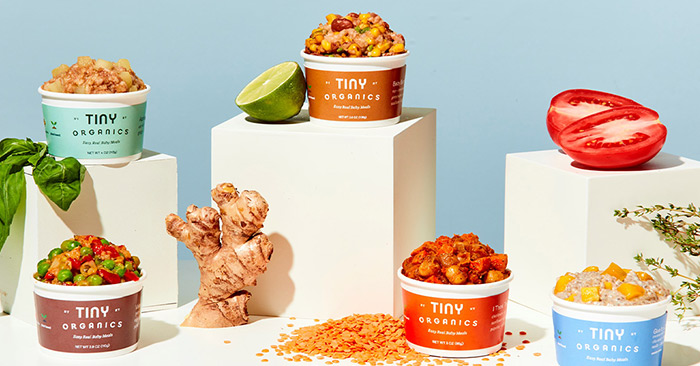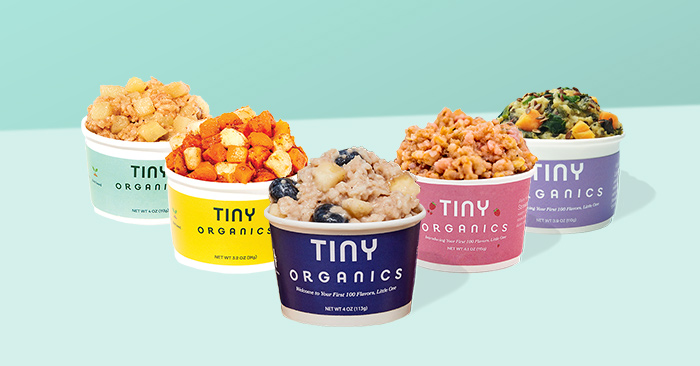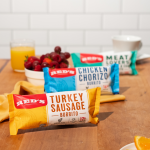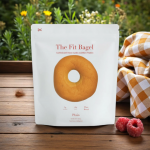Frozen Baby Food Brand Tiny Organics Raises $11M

Frozen direct-to-consumer baby food maker Tiny Organics announced this week that it has closed an $11 million funding round.
The brand, whose mission is to help parents introduce their babies to more flavors, will use the funding to expand its marketing efforts and grow its team as it works to capitalize on consumer interest in frozen products, which accelerated during the COVID-19 pandemic.
Springdale Ventures led the founding round, with additional participation by InvestEco, Silas Capital, Human Ventures, VegInvest, Babylist, Gaingels, XFactor Ventures, Natureza and Howard Morgan. Previous investors Elizabeth Street Ventures, Rocana Ventures, Chingona Ventures, Bonin Ventures, Gary Vaynerchuk and Liz Lange also participated in the round.
Genevieve Gilbreath, co-founder and general partner of Springdale Ventures, has also joined Tiny Organic’s board. The latest capital raise follows a $2.5 million seed round in 2019.
Launched in January 2020 by co-founders and co-CEOs Betsy Fore and Sofia Laurell, Tiny Organics focuses on introducing babies and toddlers to their “first 100 flavors” through plant-based meals inspired by different cultures. The gourmet inspired options range from Coconut Curry to Ratatouille to Valencian Paella. By offering whole foods rather than purees, the brand hopes to assist moms with “baby-led weaning,” or allowing a child to feed themselves.
Designed in partnership with nutritional scientists at the The Gerald J. and Dorothy R. Friedman School of Nutrition Science and Policy at Tufts University, the meals are sold via a subscription model in 12-packs ($5.49 per meal) and 24-packs ($4.69 per meal). The meals are suitable for ages six months to three years.
“Our mission is really to shape the palates of a generation to prefer and love vegetables from the earliest days, to prevent chronic diseases and obesity later in life,” Fore said. “It’s really more of a Montessori approach to first foods, building independent thinkers and eaters for life.”

Tiny Organics will use the funding to grow its “tiny but mighty” team, Laurell said. They’ll also use the capital to scale the brand’s marketing efforts to reach its target consumers: millennial moms. For example, during the pandemic, the brand hosted virtual “Supper Clubs,” a sort of digital “mom’s night off,” Laurell said. The series helped the brand grow organically, and now will transition to an in-person event series.
“We always say there’s almost no more viral word of mouth than that of a mom who’s convinced,” Fore said. “What we’ve built with these Supper Clubs is an incredible organic growth number that makes up the majority of our acquisition.”
That close connection to community has helped the company grow through the direct-to-consumer (or as Laurell and Fore like to call it, “direct-to-community”) channel. Although Laurell and Fore are new to the food and beverage industry, they believe their digital and tech backgrounds have helped the brand stand out, especially during the pandemic.
Laurell and Fore say they are “bullish” on frozen products, an approach that has proven successful for baby brands such as Raised Real, which was acquired by Once Upon a Farm this week. Frozen products not only ensure freshness and convenience, but also lean into familiar parental behaviors, like freezing breast milk, Fore said.
“The freezer section at retail has been blowing up and there’s this kind of Renaissance to frozen that it is fresh and equated as such or even better sometimes,” Fore said.
Even though Tiny Organics has been focused on e-commerce sales since its founding, Fore said the company’s “North Star” is to make its products accessible to low-income families via the Special Supplemental Nutrition Program for Women, Infants and Children (WIC). That designation would necessitate an eventual launch into retail. The brand has built on this goal through a collaboration with Partnership for a Healthier America (PHA) through its “Veggies Early & Often” campaign. Earlier this year, the brand co-designed an icon with PHA that can be featured on product packaging that indicates a baby food brand’s high vegetable content, with the objective to create transparency and health equity in baby food.
“Truly we do want to meet mom where she is,” Fore said. “We do not want to be this one percent-y, kind of coastal brand. We want to bring access to vegetables to the nation.”

















